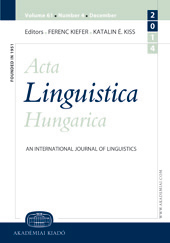Variability in Hungarian address forms
Variability in Hungarian address forms
Author(s): Ágnes DomonkosiSubject(s): Semantics, Pragmatics, Finno-Ugrian studies
Published by: Akadémiai Kiadó
Keywords: address forms; T and V forms; variability; social deixis; transfer of address;
Summary/Abstract: This paper discusses characteristics of the variability in Hungarian address forms on the basis of questionnaire and interview data. Based on the results of her sociolinguistic study (Domonkosi 2002), the author argues that, beyond the dichotomy of T vs. V form, the Hungarian address system has a number of address variants of different social indexical value, which define the typical use and functions of the distinct variants. The analysis demonstrates that there are differences in the address of different age groups that are indicative of change in address in Hungarian. The paper also reports on intradyadic variability in address, the possible functions of switching of address and the correlation between the nature of the relationship vs. the number and type of possible address variants. The findings show that in today’s Hungarian address switching between T and V form indicates a change in the quality of the relationship, that a dynamic switching back and forth between T and V forms is not usual, and that variants of nominal address forms signal emotional shades of meaning in relationships. The study also discusses possibilities of transfer of address and typical changes in the value of address forms, illustrating with empirical data how Hungarian kinship terms are used in non-literal ways.
Journal: Acta Linguistica Hungarica (Since 2017 Acta Linguistica Academica)
- Issue Year: 57/2010
- Issue No: 1
- Page Range: 29-52
- Page Count: 24
- Language: English

